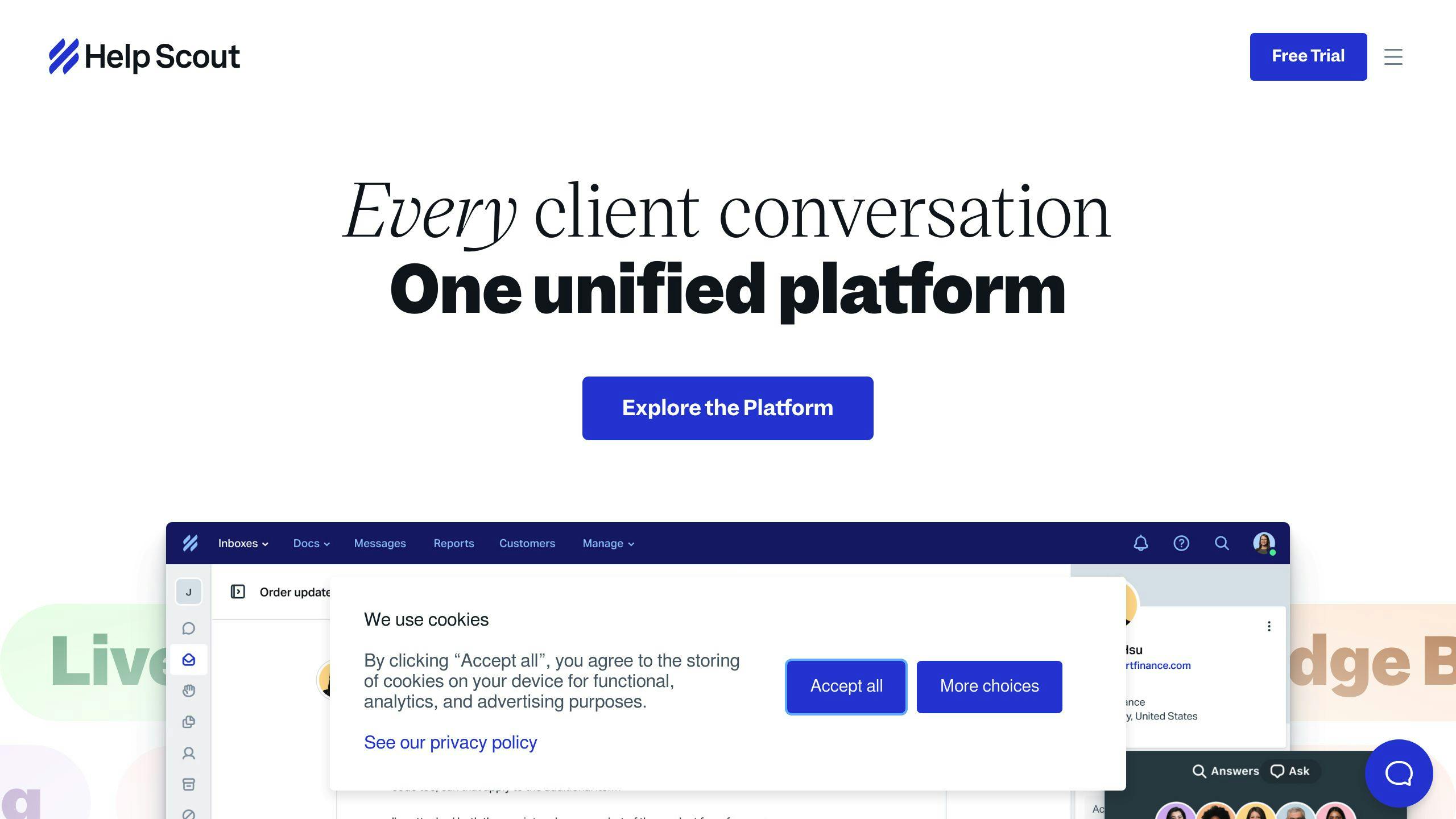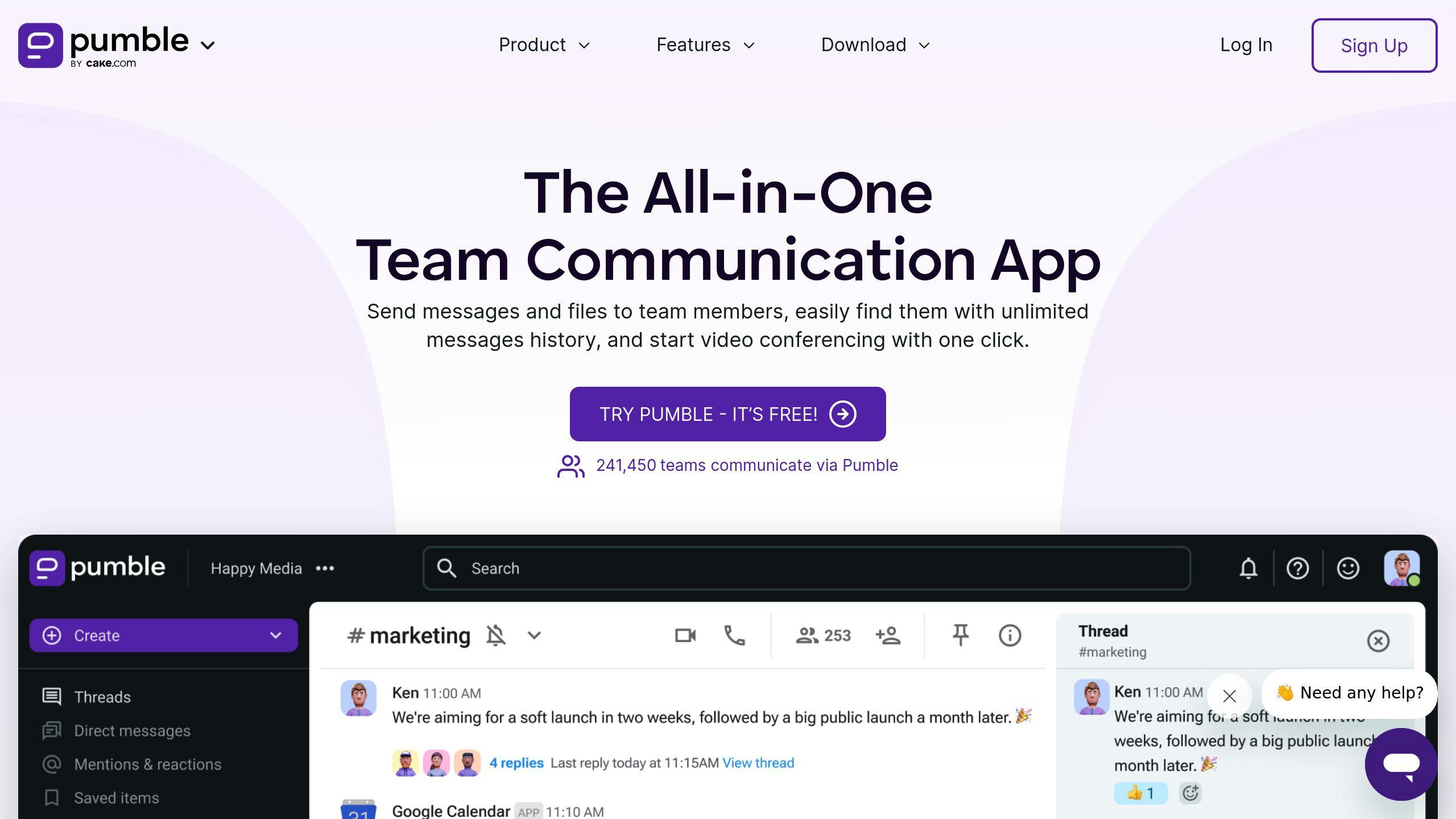Looking for the best client communication tool for your business? Here's a quick rundown of the top 5 options to help you decide:
- Zendesk: Advanced features and integrations for large enterprises. Pricing: $19–$115/agent/month.
- Help Scout: Simple, email-focused tool for small to medium businesses. Pricing: $20–$60/user/month.
- SurveyMonkey: Best for collecting and analyzing client feedback. Pricing: Free–$99/user/month.
- ProProfs Help Desk: Budget-friendly and easy to use for small teams. Pricing: $15–$30/user/month.
- Pumble: Affordable real-time collaboration tool. Pricing: Free–$1.99/user/month.
Quick Comparison Table
| Tool | Strengths | Limitations | Best For | Pricing |
|---|---|---|---|---|
| Zendesk | Advanced features, scalability | Complex, expensive | Large enterprises | $19–$115/agent/month |
| Help Scout | Simple, easy to use | Limited scalability, fewer features | Small/medium businesses | $20–$60/user/month |
| SurveyMonkey | Excellent for feedback collection | Narrow functionality | Feedback-focused organizations | Free–$99/user/month |
| ProProfs | Budget-friendly, all-in-one | Limited customization | Small teams | $15–$30/user/month |
| Pumble | Real-time collaboration | Basic features | Teams needing instant communication | Free–$1.99/user/month |
Each tool caters to different needs, from enterprise-level solutions to affordable options for small teams. Read on to find the best fit for your business.
Best Shared Email Inbox 2025? Superhuman vs Missive vs Help Scout vs Front vs Intercom vs Zendesk

1. Zendesk Overview
Zendesk serves as a versatile client communication platform, offering tools to manage customer interactions seamlessly. At its core, it includes a unified ticketing system, support across multiple channels, and automation features to simplify workflows [1].
Here’s a quick breakdown of Zendesk’s pricing plans:
| Plan | Price (per agent/month) | Key Features |
|---|---|---|
| Support Team | $19 | Basic ticketing, email support |
| Support Professional | $55 | Multilingual support, custom workflows |
| Support Enterprise | $115 | Advanced security, AI-driven tools |
For agencies handling multiple clients, Zendesk's omnichannel capabilities and integrations help centralize communication. The platform works effortlessly with tools like Zoom, monday.com, Asana, and Atlassian, ensuring teams can track all client interactions without juggling multiple apps [1][2].
Zendesk is designed to grow with your team. Its automation features and app marketplace make it ideal for scaling businesses. A Forrester Consulting study found that companies using Zendesk saw a 286% return on investment within three years [3].
"After implementing Zendesk, HeliosX achieved a 50% reduction in staffing costs while simultaneously improving their customer satisfaction score by 7%" [3].
That said, smaller teams or those with simpler needs might find Zendesk’s extensive features overwhelming [2]. For complex workflows and businesses requiring high-level customization, Zendesk is a strong choice. Features like HIPAA compliance, advanced security, and detailed access controls make it particularly appealing for organizations with strict security standards [2][3].
However, if simplicity is your priority, alternatives like Help Scout might be a better fit for smaller teams.
2. Help Scout Overview
Help Scout is a customer support platform designed for simplicity and team collaboration. Unlike Zendesk, which offers a more feature-packed experience, Help Scout focuses on creating an easy-to-use interface that emphasizes personal interactions. This makes it a popular choice for businesses that value straightforward client communication workflows [6].
Pricing Plans
Here’s a breakdown of Help Scout’s pricing options:
| Plan | Price (per user/month) | Features |
|---|---|---|
| Standard | $20 | Basic support tools, shared inbox |
| Plus | $35 | Advanced reporting, customization |
| Pro | $60 | HIPAA compliance, advanced analytics |
Help Scout streamlines routine tasks through automation and improves team efficiency with shared inboxes and collaboration tools. These features enhance response times and client satisfaction [6]. The platform also offers over 100 pre-built integrations, though many are only available on higher-tier plans, which can limit flexibility for some users.
For smaller teams or businesses with straightforward support needs, Help Scout’s focus on simplicity can be a great fit. However, as businesses grow, they may find its scalability and feature set somewhat limited. Notably, Help Scout lacks native voice or SMS functionality, which might require additional third-party tools, increasing overall costs [3].
"Help Scout's strengths lie in its simplicity and automation, but it lacks scalability, robust integrations, and native voice/SMS features" [3][6].
While Help Scout is ideal for smaller teams, businesses looking for more comprehensive omnichannel support might want to explore alternatives like SurveyMonkey.
3. SurveyMonkey Overview

SurveyMonkey focuses on helping businesses gather and analyze client feedback through customizable surveys. This structured feedback allows companies to fine-tune their communication strategies and address customer concerns more efficiently.
Pricing Structure
| Plan | Price (per user/month) | Key Features |
|---|---|---|
| Basic | Free | Limited survey creation, 10 questions per survey |
| Standard | $32 | Custom branding, advanced logic, data exports |
| Ultimate | $99 | Advanced analytics, phone support, HIPAA compliance |
SurveyMonkey integrates smoothly with tools like Salesforce, HubSpot, and Slack, making it easier to collect feedback without disrupting existing workflows.
The platform’s AI tools help pinpoint trends in client feedback, offering actionable insights for improving services. Businesses have found these tools especially useful for enhancing customer satisfaction.
"SurveyMonkey's analytics tools have proven particularly effective for businesses seeking to improve client satisfaction. For instance, a retail company using SurveyMonkey's feedback analysis features reported a 20% increase in customer loyalty after implementing changes based on survey insights."
While the free plan has limitations that might not suit growing businesses, SurveyMonkey provides helpful features like a wide range of templates, multiple survey distribution options, and strong data security compliant with GDPR standards.
The platform has shown its value in specialized fields like healthcare and education, where targeted feedback is critical. However, for businesses that require instant client support, alternatives like ProProfs Help Desk might be a better fit.
sbb-itb-f031672
4. ProProfs Help Desk Overview

ProProfs Help Desk simplifies workflow management with its easy-to-use interface that combines tools for ticket management, live chat, and a knowledge base.
Pricing Structure
| Plan | Price (per user/month) | Key Features |
|---|---|---|
| Essential | $15 | Ticket management, basic reporting |
| Premium | $20 | Live chat, knowledge base, automation |
| Business | $30 | Advanced workflows, custom branding |
| Enterprise | Custom pricing based on needs | Dedicated support, custom integration |
Note: Pricing is based on annual billing.
ProProfs brings email, chat, and social media together in one dashboard, making it a great fit for smaller teams. Agencies, in particular, can benefit from this unified approach by streamlining client communication and offering self-service options. These features not only reduce workload but also enhance client satisfaction. For instance, the automation tools and knowledge base help cut down on repetitive inquiries, with one retail client reporting a 30% drop in support tickets.
"Our studies indicate that 75% of businesses using ProProfs Help Desk reported a measurable decrease in customer complaints, with the knowledge base feature being particularly effective in reducing repetitive inquiries."
ProProfs also integrates well with popular CRMs and productivity tools, ensuring it fits smoothly into existing systems. However, its customization options for the user interface are somewhat limited compared to other platforms. The 24/7 support and free trial make it simple for businesses to try before committing.
This platform is a great choice for small to medium-sized businesses, offering a balanced set of features. While ProProfs focuses on providing an all-in-one solution, Pumble offers an alternative by prioritizing team collaboration and real-time communication.
5. Pumble Overview

Pumble focuses on real-time collaboration, setting it apart from platforms like Zendesk's ticketing system or Help Scout's shared inbox. It's designed for teams that depend on instant communication, offering tools like instant messaging, video calls, and file sharing - all in one workspace.
Pricing Structure
| Plan | Price (per user/month) | Key Features |
|---|---|---|
| Free | $0 | Basic messaging, file sharing, 10GB storage |
| Pro | $1.99 | Unlimited message history, screen sharing |
| Enterprise | Custom | Advanced security, dedicated support |
For marketers and agencies managing multiple clients, Pumble's collaboration tools can help speed up response times and make teams more efficient. It integrates with tools like Google Drive and Trello, keeping workflows organized while handling client communications seamlessly.
Pumble also prioritizes security, adhering to GDPR and SOC 2 standards to protect sensitive client information. This makes it a good fit for agencies managing confidential discussions.
Key Advantages for Client Communication
| Feature | Benefit |
|---|---|
| Channel Organization & Search | Dedicated spaces for clients/projects with easy access to past chats |
| Video Meetings | Quick one-click video calls with screen sharing |
| File Management | Centralized storage with version control |
Pumble strikes a balance between simplicity and functionality, offering tools to streamline communication without unnecessary clutter. Its search feature makes it easy to locate past messages and files, saving valuable time. While its video conferencing options are more basic compared to specialized platforms, the low cost makes it appealing for small to mid-sized businesses.
"Our internal studies show that teams using Pumble's integrated approach to client communication report a 40% reduction in email volume and a 25% increase in client response satisfaction rates", says Sarah Chen, Lead Product Manager at Pumble.
However, Pumble’s straightforward design might not meet the needs of businesses requiring more advanced communication features, as we’ll discuss in the next section.
Strengths and Weaknesses of Each Tool
Let's break down the strengths, limitations, and ideal use cases for each tool we've discussed.
| Tool | Key Strengths | Notable Limitations | Best Suited For |
|---|---|---|---|
| Zendesk | - Wide range of support tools - Extensive integrations - Advanced automation |
- Complex navigation - Higher cost ($55-115/agent/month) - Steep learning curve |
Large enterprises with complex support needs |
| Help Scout | - Easy-to-use interface - Simple pricing - Strong collaboration tools |
- Limited scalability - Fewer integrations - Basic automation options |
Small to medium businesses focused on email support |
| SurveyMonkey | - Excellent survey tools - Highly customizable - Intuitive design |
- Limited support features - Not a full help desk solution - Narrow functionality |
Organizations prioritizing feedback collection |
| ProProfs Help Desk | - Simple interface - Budget-friendly - Includes a knowledge base |
- Limited scalability - Basic integrations - Fewer advanced features |
Small businesses looking for simplicity |
| Pumble | - Real-time collaboration - Affordable ($1.99/user/month) - Strong file-sharing capabilities |
- Basic video tools - Fewer advanced features - Newer platform |
Teams focused on instant communication |
Performance Insights
According to Forrester Consulting, Zendesk users achieved a 286% ROI over three years [3]. For example, HeliosX saw a 50% reduction in costs and a 7% improvement in CSAT after switching to Zendesk [3].
Tool Selection Considerations
Zendesk's Suite Professional plan ($115/month per agent) offers features like:
"The Total Economic Impact study shows that the right tool drives measurable outcomes by improving client interactions."
When deciding, think about factors like scalability, integration requirements, budget, and how easily your team can adopt the tool. While Zendesk is ideal for larger enterprises due to its advanced features, smaller teams may benefit more from Help Scout's simplicity or Pumble's affordable communication tools.
The best choice depends on matching the tool's features to your business's specific needs and objectives.
Final Thoughts
After reviewing the strengths and limitations of each tool, here are the main points to help guide your decision.
The best choice depends on your organization's specific needs and growth stage. For marketers and agencies handling client relationships, selecting the right communication tool can simplify workflows, improve client satisfaction, and deliver measurable outcomes.
For larger enterprises managing complex operations, Zendesk stands out with its extensive features and a reported 286% ROI [3], which aligns with its $55-115/agent monthly pricing. Small to medium businesses might prefer Help Scout for its user-friendly interface and email-focused design. SurveyMonkey specializes in feedback collection, while ProProfs Help Desk offers a cost-effective option for support needs. For teams focused on real-time communication, Pumble provides an affordable and straightforward solution.
"Studies show that selecting the right communication tool can significantly enhance client interactions, leading to measurable business outcomes such as higher ROI and improved satisfaction rates."
While some tools come with higher initial costs, features like HIPAA compliance, live analytics, and extensive integrations [4][5] can deliver long-term benefits for growing organizations. When making your decision, consider these factors:
- Communication demands and volume
- Compatibility with existing systems
- Team size and scalability
- Budget constraints and potential ROI
- Time required for implementation and training



